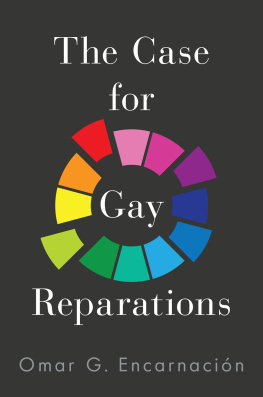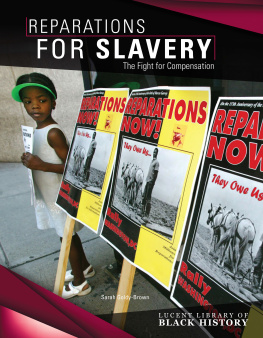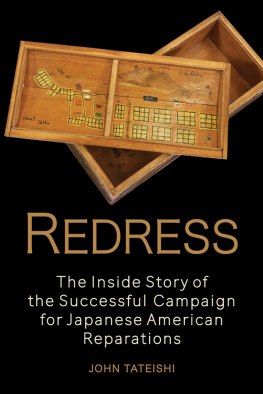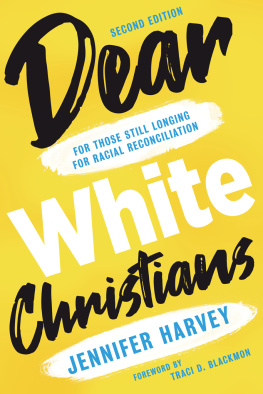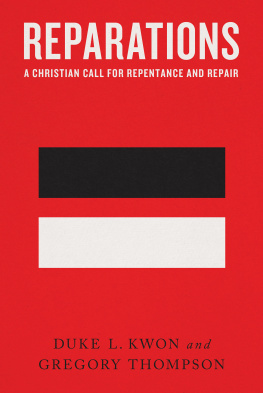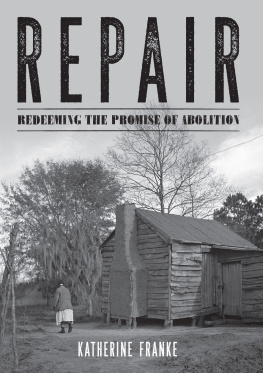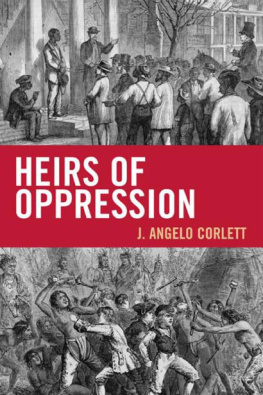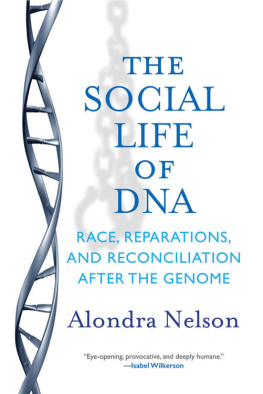The Case for Gay Reparations

Oxford University Press is a department of the University of Oxford. It furthers the Universitys objective of excellence in research, scholarship, and education by publishing worldwide. Oxford is a registered trade mark of Oxford University Press in the UK and certain other countries.
Published in the United States of America by Oxford University Press
198 Madison Avenue, New York, NY 10016, United States of America.
Oxford University Press 2021
All rights reserved. No part of this publication may be reproduced, stored in a retrieval system, or transmitted, in any form or by any means, without the prior permission in writing of Oxford University Press, or as expressly permitted by law, by license, or under terms agreed with the appropriate reproduction rights organization. Inquiries concerning reproduction outside the scope of the above should be sent to the Rights Department, Oxford University Press, at the address above.
You must not circulate this work in any other form and you must impose this same condition on any acquirer.
CIP data is on file at the Library of Congress
ISBN 9780197535660
eISBN 9780197535684
DOI: 10.1093/oso/9780197535660.001.0001
To the memory of
Jeremy D.T. Hughes,
beloved friend and mentor
Contents
I refer to this book as my accidental book. In June 2019, while in the midst of writing another book on the gay rights backlash, the New York Police Department apologized for the 1969 raid of the Stonewall Inn. An event emblematic of the disrespect that public authorities had for gay people at the time, the Stonewall raid triggered the Stonewall Riots, the launching pad for the contemporary gay rights movement. Like many gay rights scholars, I was stunned that the NYPD was apologizing for an event that had taken place fifty years earlier, and for which it had pointedly refused to apologize in the past. But, as a student of comparative politics, I quickly realized that the Stonewall apology had many international dimensions that were being ignored by media reports about the apology. To me, the apology signaled the arrival in the United States of gay reparations, or the attempt to make amends for a history of systemic anti-gay discrimination and violence. Although already a new front in gay rights activism in several European countries, Canada, and New Zealand, prior to the Stonewall apology the subject of gay reparations was basically unheard of in the United States.
So I put my work on the book on the gay rights backlash aside for a few days and wrote a short essay that eventually became a New York Times op-ed making the case for a robust embrace of gay reparations in the United States, along the lines of Spain, Britain, and Germany. I argued that gay reparationswhether in the form of an apology, a pardon, or financial restitutionwere a moral obligation intended to restore dignity to the victims of anti-gay discrimination and violence. I also tied gay reparations to the broader struggle by LGBTQ people for full citizenship, understood not only as rights and responsibilities, but also respect, recognition, and the sense of belonging to a national community. Gleaned from that perspective, the struggle for gay reparations in the United States is part and parcel of the struggles by previously marginalized groupsfrom women to African Americans to immigrantsfor full acceptance into the American community.
As I often do with my non-academic writing, I sent the op-ed to Angela Chnapko, my editor at Oxford University Press. She wrote back saying how much she liked it, and that she thought that gay reparations would make a terrific subject for a book. I told her that I agreed with her view but that the timing was less than ideal since I was busy working on another book. But the idea of writing a book on gay reparations truly intrigued me. Not only did I want to make a more expansive case for gay reparations, but I was also eager to tackle some of the comparative questions raised by the politics of gay reparationssuch as what explained the rise of gay reparations as a new front in the struggle for LGBTQ equality; how gay reparations intersect with other forms of reparations, especially those intended to make amends for the legacy of racial discrimination; and why the United States fell behind other democratic peers in embracing gay reparations. I wrote back to Angela and asked her if she thought that a book on gay reparations merited putting the book on the gay rights backlash on hold. She answered with an unambiguous yes. So my first thank-you goes to Angela and Oxford University Press for supporting this book from the very start.
I am also thankful to Alicia Wittmeyer, of the New York Times, for helping me crystallize my arguments. There is nothing like having only 1,000 words in an article to force you to get your point across. I am also grateful to Matt Seaton, of the New York Review of Books, who ably edited my October 2019 essay Why Gay Reparations Time Has Come, something of a preview of this book. It was only after I wrote that essay, which allowed me to delve into the politics of gay reparations in Spain, Britain, and Germany and the lessons that they held for the United States, that I knew there was a book for me to write on the subject of gay reparations.
Because this book incorporates sweeping narratives of anti-gay discrimination and violence spanning centuries in four distinctively different countries, I had to rely on the expertise of several historians. Richard Aldous gave the section of the book pertaining to Britain a meticulous reading. Samuel Clowes Huneke advised me on historical developments in Germany. Geoffroy Huard read and critiqued the Spanish portion. Regina Kunzel advised me on the complexities of the relationship between psychiatry and homosexuality in midcentury America. I am also thankful to the three anonymous reviewers recruited by Oxford University Press to comment on the book proposal. Their thoughts and criticisms were very useful, especially in the early stages of writing. Stephen M. Engel and Cyril Ghosh, two fellow political scientists with a wealth of experience studying American LGBTQ politics, provided additional peer review. The fact that their assistance came toward the very end of the project and on very short notice made their contributions the more valuable to me.
At Bard College, my academic home since 1998, I am very grateful for the support of the Bard Research Council, which financed research trips to Spain and Washington, DC. I am also grateful for the many conversations about the subject of gay reparations with Bard colleagues, especially Karen Sullivan, Ian Buruma, and Tom Keenan. Gwen Stearns, my research assistant, patiently read several versions of the manuscript. At home, my partner, John E. Kinney, was a great sounding board for the ideas that animate the book. Sadly, this is the first book I have written since the passing of Amos, my beloved Italian greyhound. Without his constant distractions I was probably able to complete the work faster. But it was certainly a much less enjoyable experience.
Most of all, however, I am grateful to the gay reparations activists who shared their stories, insights, and materials with me. In the United States, I am very indebted to several individuals . Lisa Linsky, of the law firm McDermott Will & Emery, where she advises the Mattachine Society, provided insights into the legal struggle for gay reparations.
Overseas, I am grateful to Antoni Ruiz, the first person to be formally recognized by any government in the world for the inhumane suffering he endured because of his homosexuality as a prisoner in Francos Spain. His inspiring story of survival and redemption is the centerpiece of the analysis of the Spanish experience with gay reparations. I am also grateful to Jess Generelo and Beatriz Gimeno, both former presidents of FELGTB, Spains leading gay rights organization, for facilitating my research in Spain. Peter Tatchell was exceptionally generous in discussing his pioneering activism on behalf of human rights and gay reparations in Britain. Klaus Jetz, the president of Germanys LSVD, the countrys leading gay rights organization, walked me through the multigenerational struggle for gay reparations in contemporary Germany.

